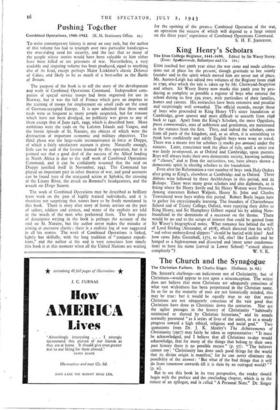The Church and the Synagogue
The Christian Failure. By Charles Singer. (Gollancz. 3s. 6d.)
DR SINGER'S challenge—an indictment not of Christianity, but of Christians—would appear to rest upon a misconception. The writer does not believe that most Christians are adequately conscious of what vast wickedness has been perpetrated in the Christian name. In so far as the majority of men are not historically minded, this may be true: but it would be equally true to say that most Christians are not adequately conscious of the vast good that Christians have done as Christians down the centuries. Nor are the uglier passages in the history of Christianity " habitually minimised or slurred by Christian historians," and its annals normally presented " as a series of lives of the saints, or as a steady progress toward a high ethical, religious and social goal." Two quotations from Dr. J. K. Mozley's The Achievements of Christianity (1917) may fairly be taken as representative: " It must be acknowledged, and I believe that all Christians to-day would acknowledge, that for many of the things that belong, to their own past history there is no possible excuse " (p. 57): " The believer cannot say: ` Christianity has done such good things for the world that its divine origin is manifest,' for he can never eliminate the possibility of the answer: ' But what of the bad things that it will do from tomorrow onwards till it is slain by an outraged world? ' " (P. xi).
But to see this book in its true perspective, the reader should begin with the preface and the concluding chapter, which is in the nature of an epilogue, and is called "A Personal Note." Dr. Singer
is the son of a Rabbi, a man of learning and wide culture, strict in his observance but liberal in his theology, a friend and associate of Israel Abrahams and Claude Montefiore. In his recollections of his boyhood two features are outstanding: the persecution of Jews in Tsarist Russia from x881 to 1891 (his father was much occupied with the relief of distress among the refugees) and the rise of Zionism, to which, as involving a reversion to a Jewish nationalism which Judaism had outgrown, his father was opposed. The charge laid upon the small community of English Jews to effect the rescue, the absorption or the re-emigration of the children of the ghetto, of refugees whose language, culture and tradition were very different from their own, and who for centuries had had all their ways of life deliberately perverted, degraded and humiliated, was accepted with noble courage and self-sacrifice. Jewish Zedakah—a term which includes both charity and justice—was equal to its enormous task. The brotherhood of Jewry as manifested in that epic of self-devotion remains a challenge and a reproach to those who profess a common Christianity and regard themselves as .the New Israel of God.
CHARLES SMYTH.



























 Previous page
Previous page